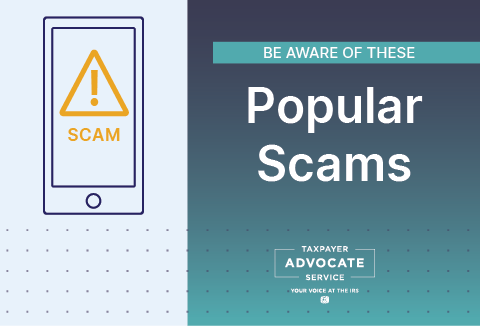IRS warns taxpayers they may be scam victims
If they filed for big refunds; misleading advice leads to false claims for Fuel Tax Credit, Sick and Family Leave Credit, household employment taxes

If it sounds too good to be true, then it probably is. Unscrupulous promoters are aggressively advertising on social media telling taxpayers that they are entitled to free money from the IRS. The IRS has received thousands of claims where it appears taxpayers are claiming credits for which they are not eligible, leading to significant refund delays. The IRS will freeze refunds for questionable claims and send the taxpayers at least one letter in response. Taxpayers will generally receive a letter asking them to verify their identity. They may also receive a letter seeking additional documentation to show they qualify for the credits claimed on the return. To avoid hefty penalties and potential follow-up action by the IRS, taxpayers who incorrectly claimed credits must promptly amend their returns to remove the questionable credit.
The IRS regularly issues alerts about scams and inaccurate social media advice. Social media schemes led to thousands of inflated refund claims during recent tax seasons. The IRS has increased its compliance efforts related to false and/or questionable credits. The IRS annually compiles a list of the Dirty Dozen tax scams. Here are explanations of some popular scams.
The Overstated Withholding scam is a scheme on social media encouraging people to use tax software to manually complete a Form W-2, Wage and Tax Statement, or other information returns (for example, Form 1099-NEC; Forms 1099-R, 1099-DIV, 1099-OID, and 1099-B) to include false income and withholding information. In this Overstated Withholding scheme, scam artists suggest people make up large income and withholding amounts as well as a fictional employer supplying those amounts. Scam artists then instruct people to file the bogus tax return electronically, with the expectation of getting a substantial refund due to the large amount of fraudulent withholding.
However, the IRS verifies the withholding claimed on tax returns. The IRS will freeze the tax return for further review if it cannot verify the wages, income, or withholding credits entered on the tax return. The IRS will send you a Notice CP05A requesting additional documentation to support the wages and withholding reported on your return. You will not receive a refund if you cannot provide this documentation. Taxpayers should always file a complete and accurate tax return.
The Fuel Tax Credit is a tax credit claimed for various nontaxable use of fuel. It is meant for off-highway business and farming uses. Few taxpayers are qualified to take the credit. Unfortunately, it is also subject to scams and aggressive marketing by promoters. Before claiming this credit make sure you qualify by going to IRS.gov and reviewing the About Form 4136, Credit For Federal Tax Paid On Fuels or check with a reputable tax professional.
The credits for sick and family leave are available to small and midsize employers and self-employed individual taxpayers for 2020 and 2021. However, the scam involves individual taxpayers filing Form 7202, Credits for Sick Leave and Family Leave for Certain Self-Employed Individuals to claim a credit based on income earned as an employee and not as a self-employed individual.
In this scam, taxpayers “invent” fictional household employees and then file Schedule H (Form 1040), Household Employment Taxes, to claim a refund based on false sick and family medical leave wages they never paid.
Once the IRS freezes a refund due to a questionable claim, some taxpayers may receive a letter 5747C and/or 4883C/5071C with instructions to verify their identity and tax return information so the IRS can continue processing their tax return.
Even after this verification, taxpayers must file an amended return to remove the questionable credit before the IRS will process the refund.
Taxpayers in receipt of a 3176C letter and/or a CP05A notice should follow the directions on the correspondence. Taxpayers receiving these letters may have previously received a 5747C letter and/or a 5071C letter to verify your identity and tax return information. In this instance, disregard the 5747C or 5071C. Do not visit a Taxpayer Assistance Center or try to authenticate online or over the phone. Taxpayers who didn’t file the tax return should send in a completed and signed Form 14039, Identity Theft Affidavit.
Legitimate taxpayers qualifying for these credits can submit documentation showing they qualify for the credit.
To avoid penalties and potential follow-up action by the IRS, taxpayers who filed inaccurate tax returns need to promptly file an amended tax return to correct any inaccuracies.
Taxpayers can visit the IRS.gov tool Should I file an amended return? to determine if they should amend their return. The IRS will not process the amended return until the original return has completed processing.
The entire refund amount is frozen on returns with these incorrect claims. Taxpayers will not receive any portion of their refund, even if they also claimed legitimate credits
The Taxpayer Advocate Service (TAS) urges you to use caution when choosing a tax return preparer. Anyone can be a paid tax return preparer if they have an IRS Preparer Tax Identification Number (PTIN). However, tax return preparers have differing levels of skills, education, and expertise. A major red flag is when the tax return preparer is unwilling to sign the tax return.
To report those who promote abusive tax practices and tax preparers who intentionally file incorrect returns, submit a completed Form 14242, Report Suspected Abusive Tax Promotions or Preparers, and any supporting materials to the IRS Lead Development Center in the Office of Promoter Investigations.
Submit by Mail:
Internal Revenue Service Lead Development Center
Stop MS5040
24000 Avila Road
Laguna Niguel, California 92677-3405Submit by Fax:
877-477-9135
Alternatively, taxpayers and tax professionals may send the information to the IRS Whistleblower Office for possible monetary reward. For more information, see Abusive Tax Schemes and Abusive Tax Return Preparers.
Want to get the latest tax news, learn more about taxpayer rights, and upcoming TAS events while looking at cute dogs and pop culture references? Look no further than TAS Social Media. Follow, like and share our content to help spread the work on how we advocate for taxpayers!
